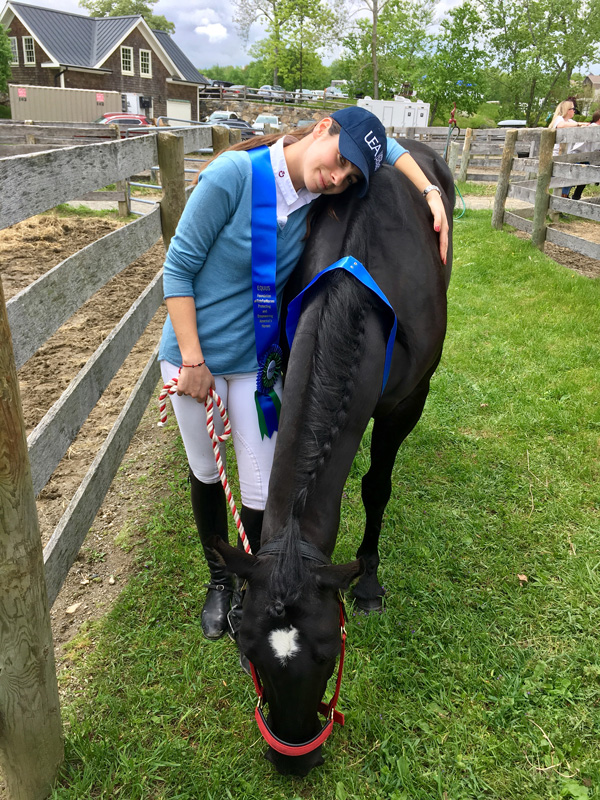Above: Opening Day ceremonies at the Hampton Classic featured a parade of adoptable horses presented by the Equus Foundation: Left to right Equus Foundation founder and president, Lynn Coakley; author and renowned animal-welfare advocate as well as host of Animal Planet’s Dog Bowl Specials, Jill Rappaport; Equus Foundation vice president of communications, Valerie Angeli; EquuStar Brianne Goutal-Marteau with Mikey, at the Equus Foundation Meet & Mingle with adoptable horses, and later adopted by Goutal-Marteau.
Ensuring that America’s horses are safe and live in comfort with purpose and dignity.
When my youngest daughter headed off to college, it came time for our horses to transition to their next chapters,” said Equus Foundation president Lynn Coakley. Coakley was fortunate to be able to provide their horses with a comfortable and safe environment where they could enjoy the remainder of their lives. However, in the process of exploring the options, she learned that many horses in transition find themselves at risk for abuse and neglect because their owners can no longer care for them.
Most disturbing to learn was that thousands of horses are shipped across the borders for slaughter each year—over 75,000 in 2017. Most are young and healthy and have untapped potential. Horse owners often bring their animals to local livestock auctions with the expectation that the horse will find a good home, unaware that middlemen who represent or sell to horse slaughter plants—called kill buyers—frequent these auctions. Every horse, even champions in the show ring and on the racetrack, may only be one unlucky sale away from a kill buyer.
This eye-opening milestone inspired Coakley to establish the Equus Foundation in 2002 to provide financial support to a handful of equine charities in Connecticut and New York. The Equus Foundation has since grown to be the only national charity in the United States 100 percent dedicated to protecting America’s horses and strengthening the bond between horses and people.
The foundation provides financial support, recognition, resources, guidance, and services to equine organizations that rescue, rehabilitate, retrain, and rehome America’s horses in transition; provide retirement opportunities for aged horses; and enable horses to change people’s lives, especially in the area of equine-assisted activities and therapies (EAAT) for people with special needs.
“While we would like to think that all charities are successful in their missions, unfortunately there is a great disparity in horse-care practices among equine charities in the United States,” said Coakley. Especially now, with the advent of the internet and social media, it has become increasingly necessary to make sure that organizations making appeals to potential donors are fully transparent and operating at the highest standards of horse care.
Equine charities seeking financial support from the foundation undergo a comprehensive and unique verification process to ensure donor confidence in the charities selected each year.
“All of America’s horses deserve homes where they can live in comfort and with dignity throughout their lives and flourish not only as athletes, but also as companions, teachers, and especially healers,” said Valerie Angeli, vice president for engagement.
“We rely on iconic equestrians like our EquuStars to help raise awareness of our mission,” Angeli continued. “They often join us at our Next Chapters equine welfare and adoption events. Most recently, we added an online component featuring horses ready for adoption, but what makes it unique is that it also includes listings by organizations seeking program horses for therapy and lessons. We want to make horse owners aware of all the options when they are faced with having to transition their horses.”
Today, the benefits of the human-animal bond have never been more apparent, and equine-assisted therapy is highly recognized as an enhancement and complement to the benefits of traditional therapy.

Horses are powerful teachers and healers, positively influencing not only our happiness but also our health.
One in five of all Americans has a disability. That’s 48.9 million people who would be able to benefit from the magic and power of horses if the opportunities were available. “Only 65,000 people are currently benefitting from EAAT. We’ve only begun to tap the surface,” said Coakley, “and the more recognition of the success of EAAT, the more jobs there will be for horses.”
“We’ve come a long way, having awarded nearly $3.7 million to hundreds of charities nationwide. But still less than 10 percent of potentially eligible charities receive minimal financial support ranging from $500 to $5,000,” continued Coakley. “Too many horses in this country need a life-line and opportunities to thrive.
“Our goal is to provide financial support to all the deserving charities that are ensuring a future for America’s horses and to inspire all horse lovers to become horse protectors,” she concluded. “Whether you are a competing equestrian, a pleasure rider, or someone who loves horses, everyone can be a star for America’s horses.”
